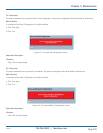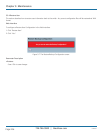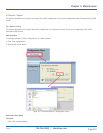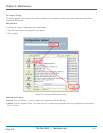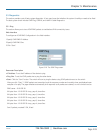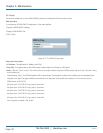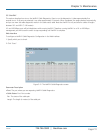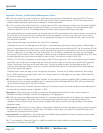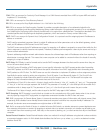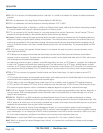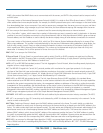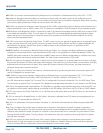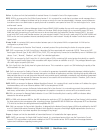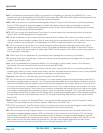
724-746-5500 | blackbox.com
724-746-5500 | blackbox.com
Page 217
Appendix
Policer: A policer can limit the bandwidth of received frames. It is located in front of the ingress queue.
POP3: POP3 is an acronym for Post Office Protocol version 3. It is a protocol for e-mail clients to retrieve e-mail messages from a
mail server. POP3 is designed to delete mail on the server as soon as the user has downloaded it. However, some implementa-
tions allow users or an administrator to specify that mail be saved for some period of time. POP can be thought of as a "store-
and-forward" service.
An alternative protocol is Internet Message Access Protocol (IMAP). IMAP provides the user with more capabilities for retaining
e-mail on the server and for organizing it in folders on the server. IMAP can be thought of as a remote file server. POP and
IMAP deal with the receiving of e-mail and are not to be confused with the Simple Mail Transfer Protocol (SMTP). You send
e-mail with SMTP, and a mail handler receives it on your recipient's behalf. Then the mail is read using POP or IMAP. IMAP4 and
POP3 are the two most prevalent Internet standard protocols for e-mail retrieval. Virtually all modern e-mail clients and servers
support both.
Private VLAN: In a private VLAN, communication between ports in that private VLAN is not permitted. A VLAN can be
configured as a private VLAN.
PTP: PTP is an acronym for Precision Time Protocol, a network protocol for synchronizing the clocks of computer systems.
QCE: QCE is an acronym for QoS Control Entry. It describes QoS class associated with a particular QCE ID. There are six QCE
frame types: Ethernet Type, VLAN, UDP/TCP Port, DSCP, TOS, and ag Priority. Frames can be classified by one of 4 different QoS
classes: "Low", "Normal", "Medium", and "High" for individual application.
QCL: QCL is an acronym for QoS Control List. It is the list table of QCEs, containing QoS control entries that classify to a specific
QoS class on specific traffic objects. Each accessible traffic object contains an identifier to its QCL. The privileges determine spe-
cific traffic object to specific QoS class.
QL: QL In SyncE this is the Quality Level of a given clock source. This is received on a port in an SSM indicating the quality of the
clock received in the port.
QoS: QoS is an acronym for Quality of Service. It is a method to guarantee a bandwidth relationship between individual applica-
tions or protocols. A communications network transports a multitude of applications and data, including high-quality video and
delay-sensitive data such as real-time voice. Networks must provide secure, predictable, measurable, and sometimes guaranteed
services. Achieving the required QoS becomes the secret to a successful end-to-end business solution. Therefore, QoS is the set
of techniques to manage network resources.
RARP: RARP is an acronym for Reverse Address Resolution Protocol. It is a protocol that is used to obtain an IP address for a given
hardware address, such as an Ethernet address. RARP is the complement of ARP.
RADIUS: RADIUS is an acronym for Remote Authentication Dial-n User Service. It is a networking protocol that provides central-
ized access, authorization, and accounting management for people or computers to connect and use a network service.
RDI: RDI is an acronym for Remote Defect Indication. It is an OAM functionallity that is used by a MEP to indicate a defect
detected to the remote peer MEP.
RSTP: In 1998, with document 802.1w, the IEEE introduced an evolution of STP: the Rapid Spanning Tree Protocol, which provides
for faster spanning tree convergence after a topology change. Standard IEEE 802.1D-2004 now incorporates RSTP and obsoletes
STP, while at the same time being backwards-compatible with STP.
SHA: SHA is an acronym for Secure Hash Algorithm. It designed by the National Security Agency (NSA) and published by the NIST
as a U.S. Federal Information Processing Standard. Hash algorithms compute a fixed-length digital representation (known as a
message digest) of an input data sequence (the message) of any length.
Shaper: A shaper can limit the bandwidth of transmitted frames. It is located after the ingress queues.
SMTP: SMTP is an acronym for Simple Mail Transfer Protocol. It is a text-based protocol that uses the Transmission Control
Protocol (TCP) and provides a mail service modeled on the FTP file transfer service. SMTP transfers mail messages between
systems and notifications regarding incoming mail.
LGB1108A



